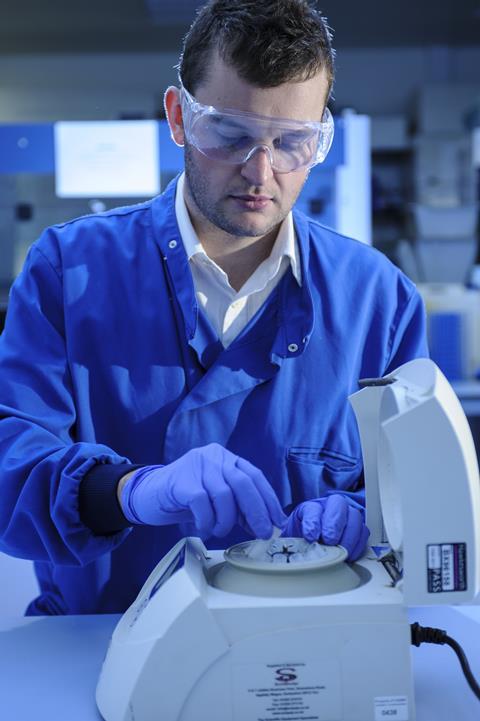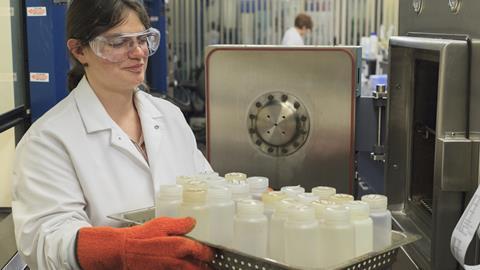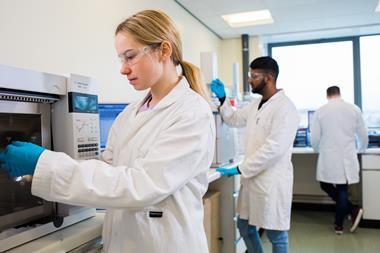Why technicians need more recognition for their essential role in science
If you want to know what’s really going on in a chemistry lab, ask the technician. They keep everything running smoothly, know the trick to getting that temperamental piece of equipment working and make sure missing chemicals are ordered. But universities are set to lose this valuable resource. ‘41% [of technicians] are due to retire in the next 10 years,’ explains Kelly Vere, higher education engagement manager at the Science Council and director of technical skills and strategy at the University of Nottingham, UK. ‘That’s actually a ticking time bomb, because we are not training enough younger people with those skills.’
The issue with recruiting and retaining new technical staff is not financial – Vere estimates most salaries are between £20,000–£40,000 but can rise to £60K. The problem is a lack of professional recognition and few career development opportunities. ‘They are leaving because they don’t feel valued by their institutions,’ says Terry Croft, director of The National Technician Development Centre for Higher Education, based at the University of Sheffield, UK.
Stereotypes and struggles
Vere is leading a campaign to prevent this exodus through the Science Council’s Technician Commitment – a call on universities to provide more satisfying careers for their technicians. Launched in May 2018, 66 universities have currently signed the pledge and technicians are starting to see its impact. ‘Rough data says there are about 30,000 technical staff in universities in England,’ says Vere. ‘Many universities struggle to identify their technical staff and therefore don’t always know how many technicians they employ. What we are trying to do is raise visibility and recognition of this staff group.’
The problem stems from the diverse roles that technical staff perform, from the traditional supportive roles such as preparing reagents or cleaning glassware to managing highly complex equipment and developing new techniques. ‘You get this very stereotypical vision of what a technician is from the general public – a man in a white coat with a trolley – but actually it’s much more than that. They are skilled people working at the cutting edge of research and innovation,’ says Vere. Croft agrees that over the past 10–15 years the role of technicians has changed considerably, with new technology meaning that most technicians need to be highly skilled to provide academics with the support they need. And, he argues, this has yet to reach the public consciousness: ‘People’s mindsets haven’t picked up just how important [technicians] are, how highly skilled there are and the contributions that they make.’
While the majority of technicians come straight from school or college, there are now a number of technicians with higher degrees – sometimes blurring of the role of technicians and postdoctoral researchers. ‘We’ve seen a rise in postdocs actively seeking technical roles for a permanent contract,’ says Vere. ‘They can still actively participate in research but they haven’t got the pressure of having to write star papers every year and apply for research grants.
Martin Dellar, technical manager at the University of Nottingham’s School of Chemistry, agrees that many technicians now have highly specialist skills. ‘A couple of years ago, we tried to recruit a specific organic biological technician and we eventually picked up one of our previous PhD students, because we couldn’t find that level of experience and laboratory knowledge anywhere else.’ Technicians at Nottingham also co-author papers with academic staff: ‘It happens quite often, but generally when there is a very practical aspect to it – [when] we develop the equipment that the [researcher] uses which takes the research onto the next level.’
Commitment to the future
For those starting out, a technician role can also be a good move. Technician Katie Rock has just completed a two year apprentiship at the University of Surrey, UK. She says she found the job after searching for alternatives to university. ‘It was perfect,’ she says, for someone who didn’t do well at exams but still wanted a career in science. She is now hoping to start a higher level apprenticeship, which could lead to a degree level qualification. The same route has also proved ideal for Tamazon Cowley, an analytical chemistry technician at Cranfield University, UK, who wanted hands-on work experience while also doing a degree with Open University. Both Rock and Crowley felt that working as a lab technician was an attractive alternative to the student loan debts being accumulated by many of their friends. However, Cowley acknowledges the role often means her contributions are not recognised. ‘Sometimes we are overlooked a bit and [it can feel like our] work doesn’t count as much as the work of academics,’ she adds.

‘A lot of technicians are pigeon-holed,’ explains Dellar. ‘We all suffer from the same issue – that the university looks at the role rather than the person, so it becomes quite difficult to progress in certain instances, if the role doesn’t have anywhere to go.’ Dellar contrasts this to academics, where promotion is directly linked to personal achievements and not bound by their level at recruitment. Croft agrees that this is a major problem: ‘When we have spoken to technicians in their early 20s to early 30s they will say “I really enjoy my work and make a contribution, but what is my career path?” Nine times out of ten there really isn’t one, except waiting for [someone] to leave or retire.’
This is what the Technician Commitment hopes to address. ‘We were seeing self-formed technicians networks, but they were not getting real buy-in or traction from senior leadership,’ says Vere. There were few champions for technical staff as a group within universities and research organisations and they didn’t fall into anyone portfolio of responsibilities. Now, the scheme hopes to rectify this by engaging directly with senior management. ‘When vice-chancellors and directors sign up to the Technician Commitment,’ Vere explains, ‘they nominate a lead who will take that commitment forward in the organisation.’
On signing up to the Commitment, universities pledge to ensure greater visibility, recognition and career development for technicians within their institutions. The organisation then undertakes a 12-month self-assessment which culminates in a two-year action plan. ‘We don’t want to dictate to organisations what they should do,’ says Vere. ‘It’s got to come from the organisation as it’s not one-size-fits-all – we guide and offer examples.’
At Nottingham, Vere is already starting to implement the sorts of initiatives that she hopes other universities will emulate. One example of this change is to allow technicians to participate in graduation ceremonies. ‘We are going to be putting them on stage alongside academic colleagues, and they are going to be gowned up. I think that’s really symbolic.’ Dellar also explains how the design of Nottingham’s new combined STEM teaching lab has provided a higher profile for technical staff: ‘They used to sit in a teaching store [room] and dispense chemicals and equipment, they would be very static in their interaction with the students. That’s all gone. Now they are demonstrating, they go out into the lab they work with the students.’
In some universities, it is clear the Technician Commitment is already having an impact. ‘We are starting to come together as a sector,’ says Dellar. ‘Technicians now are becoming more visible and a lot of our academics do fully appreciate what a technician does.’ However, Croft warns you still too often find technicians are stuck at the lab bench during team meetings. He suggests it is now time for technicians to speak up and say: ‘look, I am an expert in this field… [we need to] get the message across to individual technicians that you are professionals, you are highly skilled, you make an excellent contribution but you too have got to be proactive and put your head above the parapet.’
Creating a community
The National Technician Development Centre for Higher Education in Sheffield aims to do just that. Launched in January 2018, the centre provides universities with another resource to enable them to create a sustainable future for their technical services. The centre’s expertise is available to all UK universities and helps them plan their future strategy for technical services.
Croft says the centre starts by helping universities identify their technical workforce. ‘We quite often go into universities and they say to us “we have 300 technicians,” and when we’ve finished they’ve got 500!’ It then works to ensure the university fosters its technician community. ‘A senior technician who looks after teaching in the school of chemistry has never really spoken to the senior technicians in charge of delivering teaching in biological sciences – but they have the same problems and the same issues,’ explains Croft. ‘We create a technicians network within a university which is run by technicians so a high number engage with it because it starts to get them to realise what contribution they are making.’
Another route to increased recognition for technicians is through professional registration. Since 2011, in partnership with the Science Council, the Royal Society of Chemistry (RSC) has awarded technicians the status Registered Science Technician (RSciTech) to demonstrate their professional experience to employers and colleagues. ‘From our point of view, RSciTech provides a very valuable way for us to recognise individuals that are performing technical roles, provides a mechanism for us to protect the standards at this level and also provides a framework for ongoing development,’ explains Richard Holliday, the RSC’s vocational skills programme manager. However, such initiatives are yet to take off: to date only around 100 Registered Science Technician designations have been awarded.
And there is still a lot of work to do – particularly in the chemical industry. Research by the Gatsby Charitable Foundation suggests that the UK needs 700,000 more technicians by 2020 across all sector. ‘We’ve had a lot of interest from industry wanting to join the initiative, which is brilliant,’ says Vere. ‘As a result, we are looking at the possibility of broadening the Commitment beyond higher education and research. But in the first instance we want to demonstrate real impact within universities and research institutes. So far it’s looking very promising.’
It could be that laboratory technicians are finally set to receive the recognition they deserve.













4 readers' comments